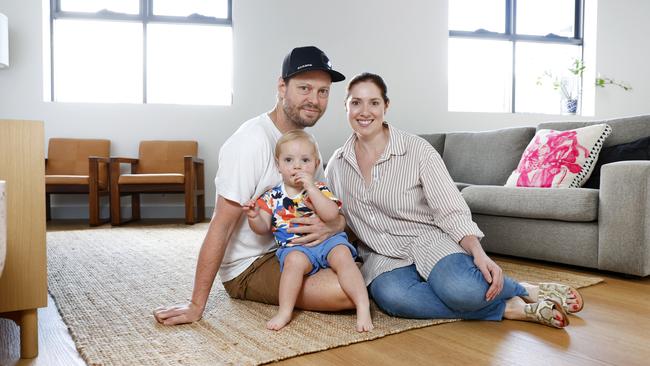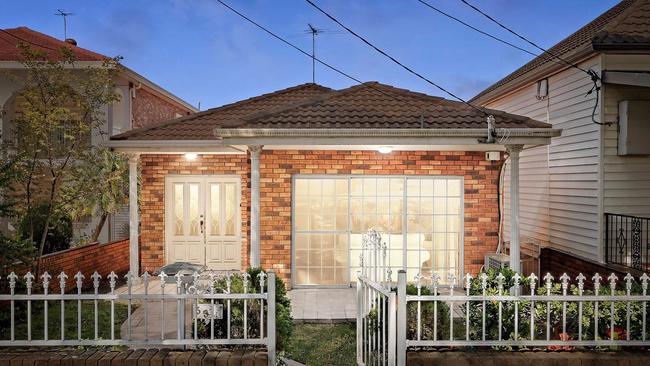How much money you need to earn to afford property in every suburb
You’ll need to earn more than $300k a year to afford a house in nearly half of Sydney due to recent rate rises. See how much money you need to make to buy in your area | INTERACTIVE
Property
Don't miss out on the headlines from Property. Followed categories will be added to My News.
Home seekers will need to earn more than $300,000 a year to afford the typical house in nearly half of Sydney thanks to the biggest interest rate hikes in 30 years.
With buyers’ borrowing capacity shrinking by nearly a quarter over the last six months, alarming mortgage analysis showed much of the market has become inaccessible for lower- and middle-income buyers.
Those who wanted to buy house at the average Sydney price of nearly $1.2m would need a household income of just over $200,000 a year after tax to be able to afford the mortgage repayments at current loan rates, the Finder.com.au study showed.
But in many areas the income requirements were much higher.
Home buyers with a 20 per cent deposit would need to earn more than $300,000 a year to afford a purchase in close to 250 suburbs, representing half of Sydney’s geographic area.

It’s more than double the number of suburbs where an income above $300,000 was required to purchase before the rate rises earlier this year.
Included in these suburbs were close to 100 areas where buying a house at the suburb median with current rates would be unaffordable for anyone earning less than $500,000.
This is if they wanted to avoid mortgage stress – defined as spending more than a third of their after tax income on repayments.
The minimum income needed to comfortably purchase a house in Sydney’s cheapest suburb – Wilmot, in the Mount Druitt area – was about $124,000 a year.
Units were more accessible. There were 24 suburbs where those who earned $75,000-$100,000 a year would be able to afford an apartment. Most were in the southwest and Parramatta region.
Finder.com.au head of consumer research Graham Cooke said the salaries required to purchase property in many areas painted a “grim” picture of deteriorating affordability.
“These figures may be pretty shocking to some,” he said. “The costs of living are increasing faster than people’s salaries and housing is the biggest component of that. A lot of households are struggling.”
Mortgage Choice broker Terri Unwin said it was staggering how little buying power an annual income like $200,000 now had.
“In the past, if you earned that, the world was your oyster,” she said. “Now that kind of income, especially if you have kids, car leases and other expenses, it doesn’t get you much in some areas.
“In the inner west, you wouldn’t get a house. It would be a unit in an older building. To purchase a house you need a big salary and decent deposit. Rarely do first homebuyers have a 20 per cent deposit.”
Canstar money expert Effie Zahos said interest rate rises have put recent first homebuyers in a vulnerable position and many wouldn’t be able to afford their loans.
Many of these households would not have had their finances stress tested for the kind of repayments they been saddled with this year, she said.

“The serviceability buffer that banks would have assessed you on has now been fully absorbed by the rate hikes,” she said. “Each repayment now has not been factored into household’s serviceability.”
PropTrack senior economist Paul Ryan said an issue for new buyers was that their borrowing capacity was shrinking faster than home prices were falling.
Rate rises have slashed the average homebuyer budget by close to a quarter over the last six months, while Sydney’s median home price has dropped by about 6 per cent.
Mr Ryan noted that affordability could improve for first-time buyers as wages lifted and he added that it was likely that home prices would continue to fall over 2023.
It comes as ratings agency Moody’s warned that falling house prices will increase the risk of home loan delinquencies and defaults for existing owners.
The research group said the weakening housing market would make it harder for borrowers in financial trouble to sell their properties at high enough prices to repay their debt.
Research by Roy Morgan showed another rate increase this year would mean more than one million property owners, or about 26.2 per cent of mortgage holders nationally, would be “at risk” due to repayments eating up too much of their income.
Increases in mortgage stress levels have been alarming, Mr Cooke said.
He pointed to Finder.com.au surveys that showed the proportion of households who reported their repayments or rents were causing them “stress” had risen from 25 per cent a few years ago to nearly 50 per cent.
Andrea and Zenon Hextall recently bought a home in Dulwich Hill and said prices hadn’t dropped far enough to make up for the higher interest they had to pay.
“We ended up buying on a main road, which wasn’t our preference, and wanted to stay on top of our loan by paying additional contributions but our ability to do that is now gone,” Ms Hextall said.
“We were conservative with how much we borrowed but we will still have to cut back on our lifestyle to pay our mortgage now. There’s not much more we can do to increase our (income). If there is another rate rise, we will have to cut into our savings.”
More Coverage
Originally published as How much money you need to earn to afford property in every suburb





